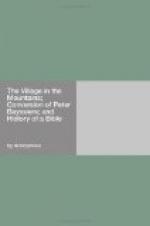“I entreat you, sir, to excuse the liberty I have taken, and to believe that, while life remains, I am, in the Spirit of our Lord Jesus Christ,”
“Your very humble servant,”
“The Widow ——.”
The reception of this letter revived in M. —— that lively interest which he had been constrained to feel for the prosperity of these happy villagers. Often had he called to mind the Christian kindness with which they received him, and often had he presented his ardent prayer to the God of grace, that he who “had begun a good work in them,” would carry it on to “the day of Jesus Christ.”
Instead of complying with the request of this venerable woman to send her six copies of the New Testament, he sent her twenty, authorizing her to sell them to such as were able to pay; but to present them, at her own discretion, to those who were desirous of obtaining them, and had not the means to purchase, “without money and without price.” With these he also presented to the widow, as a mark of his Christian affection, a Bible for her own use, together with a dozen copies of the Tract which she had requested, and several other religious books. In acknowledging this unexpected bounty, she thus replied, in a letter, dated July 17, 1821:
“Respected friend and brother in our Lord Jesus Christ,—It is impossible to describe the satisfaction that my heart experienced on the arrival of the kind communications which you have been pleased to send me. I could not help reading over and over again the letters enclosed, which afford fresh proof of the desire of yourself and your friends to contribute to the advancement of the reign of the Divine Redeemer. I cannot find words to express the happiness I have derived from perusing the entire copy of the Old and New Testament, which you beg me to accept as an expression of your christian affection. I was more gratified and edified by this mark of your regard, as it was my intention to have requested, in my last letter, some copies of the Old Testament; but I dared not execute my design, for fear of abusing your Christian kindness and charity. The Old and New Testament, properly understood, are but one Testament; such is the connection of the sacred books—for the New Testament is the key to the Old, and the Old the same to the New. In innumerable passages of the Old Testament, the birth, death, and glory of our Divine Redeemer are announced, in terms more or less distinct. In reading the prophecies of Jeremiah and Isaiah, we perceive that those prophets spoke of our Saviour almost as though they had lived with him on the earth. His second coming is also foretold in many passages, especially in the prophecies of Ezekiel and Daniel.




